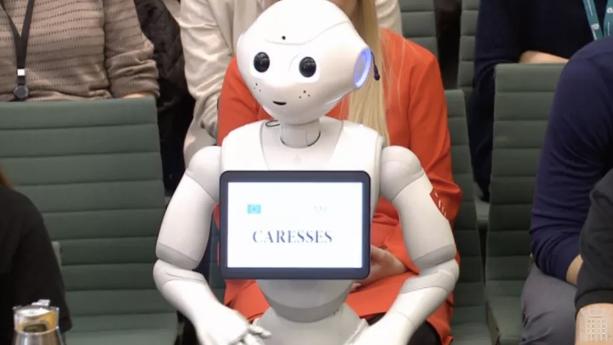(单词翻译:单击)
听力文本
Humanoid 'Pepper' Appears in Britain's Parliament
A robot appeared with British lawmakers earlier this week to demonstrate how machines are being engineered to act like human beings.
The robot is called Pepper. It is known as a humanoid, a machine designed to look and act like a person.
Pepper was called to sit Tuesday with the Education Committee in Britain's House of Commons. The parliament announced it was the first time a robot had ever appeared for questioning by lawmakers.
Japan's SoftBank Robotics launched Pepper in 2014. The robot appearing in parliament belongs to an engineering and computer science team at London's Middlesex University. The students are developing the artificial intelligence or AI programs that power Pepper. AI is the ability of a machine, such as a computer, to reproduce intelligent human behavior.
Pepper was welcomed to parliament by Robert Halfon, chairman of the Education Committee.
"Pepper, could you please introduce yourself."
"Good morning chair. Thank you for inviting me to give evidence today. My name is Pepper and I'm a resident robot at Middlesex University."
Pepper explained that it was involved in a special robot development project called Caresses. The European Commission and Japanese government launched the project in 2017. It aims to design robots that can assist older adults and "adapt to the culture of the individual they are taking care of."
Robots like Pepper are being engineered to help people carry out many common tasks and other activities. For example, a robot can help someone remember to take medicine or urge them to stay active. The humanoids can also serve as a communication link to help older adults keep in contact with family members and friends.

Engineers working on the Caresses project say they are using machine learning to make Pepper seem intelligent. They say their development methods help robots recognize the daily activities and desires of the people they are assisting.
Pepper told British lawmakers the Caresses project has helped make robots more intelligent and "culturally competent."
"Assistive, intelligent robots for older people could relieve pressure in hospitals and care homes as well as improve the care delivery at home."
Pepper added that this kind of personal robot can also be used to reduce loneliness and improve a person's quality of life.
Several British lawmakers questioned Pepper about technology subjects. But all of Pepper's answers appeared to have been pre-programmed before the committee appearance.
The technology website The Verge reported how AI and robotics researchers noted that Pepper is not equipped to listen to questions and provide answers in real-time.
A spokesman for the Education Committee spoke about the issue with The Verge. "It will be clear on the day that Pepper's responses are not spontaneous," the spokesman said.
He added that Pepper's appearance provided the chance for lawmakers "to explore both the potential and limitations of such technology and the capabilities of robots."
Martin Loomes leads Middlesex University's School of Science and Technology. He says robots are sure to play a big part in many industries in the future. But Pepper is an example of how robots can do more than purely mechanical jobs and seek to connect meaningfully with people in social and cultural ways, he added.
I'm Bryan Lynn.
重点解析
重点讲解:
1. adapt to 适应;
A large organization can be slow to adapt to change.
大机构可能应变迟缓。
2. take care of 照顾;照看;看护;
I take care of them to the best of my abilities.
我尽我所能地照顾他们。
3. serve as 用作;可当…使用;充作;
Historical experience would serve as a most important source of information.
历史的经验将是一个重要的信息来源。
4. keep in contact with 保持联系;有联系;
She took down my phone number so as to keep in contact with me.
她记下我的电话号码,以便和我保持联络。
参考译文
仿真机器人"佩珀"亮相英国议会
本周初,一个机器人与英国议员一起示范了机器是如何模拟人类的行为举止的。
这个机器人名为“佩珀”。它是仿真机器人,即外观和行为像人类一样的机器。
周二,“佩珀”被传召与英国下议院教育委员会一起进行讨论。英国议会宣布,这是议员史上首次对机器人进行问询。
日本软银机器人公司于2014年推出仿真机器人“佩珀”。亮相英国议会的机器人是伦敦米德尔塞克斯大学工程与计算机科学团队的成员。该团队的学生正在开发为“佩珀”提供电源的人工智能(简称AI)程序。人工智能是计算机等机器复制人类智能行为的能力。
教育委员会主席罗伯特·哈尔芬在英国议会欢迎“佩珀”的到来。
“佩珀,请你介绍一下自已。”
“主席先生,早上好。谢谢你邀请我今天来作证。我叫佩珀,是米德尔塞克斯大学的常驻机器人。”
“佩珀”解释说,它参与了名为“Caresses”的特殊机器人开发项目。该项目由欧洲委员会和日本政府在2017年启动。这一项目旨在设计可以协助老年人的机器人,并让机器人适应它们照顾的老人的个人文化。
“佩珀”这类机器人旨在帮助人们开展众多常见任务和其他活动。比如,机器人可以提醒人们服药,或敦促人们经常活动。仿真机器人还能作为通信枢纽,帮助老人与家庭成员和朋友保持联系。
参与“Caresses”项目的工程师表示,他们利用机器学习来让“佩珀”做到类智能。他们说,他们的开发方法能帮助机器人识别日常活动和他们所照顾人群的需求。
“佩珀”对英国议员说,“Caresses”项目提升了机器人的智能程度和“文化能力”。
“为老年人提供智能辅助机器人可以减轻医院和养老院的压力,还可以改善家庭护理服务。”
“佩珀”补充说,这种个人机器人还能减少孤独感并提升个人的生活质量。
多位英国议员就科技问题对“佩珀”进行了提问。但是,“佩珀”的所有回答看似都是在出席听证前编写好的预编程答案。
科技网站The Verge报道称,人工智能和机器人研究员指出,“佩珀”不具备听取问题并提供实时答案的能力。
教育委员会一名发言人就这一问题接受了The Verge的采访。该发言人表示,“显然,佩珀当天的回答不是自发的。”
他补充道,“佩珀”出席听证会为议员提供了机会——可以探索此类技术的潜力和限制以及机器人能力的机会。
马丁·卢默斯是米德尔塞克斯大学科学技术学院的负责人。他说,机器人未来一定会在许多行业中发挥重大作用。他还指出,“佩珀”是一个例子,它证明了机器人不只可以处理纯机械性工作,还能在社交和文化方面寻求与人类建立有意义的联系。
布莱恩·林恩报道。
译文为可可英语翻译,未经授权请勿转载!


